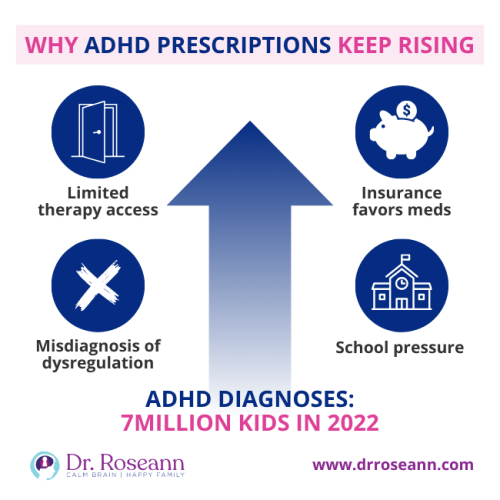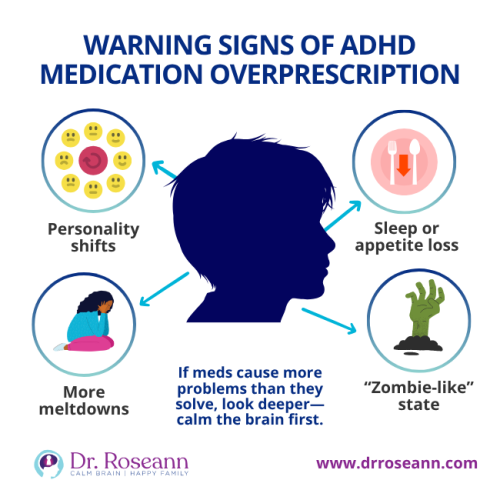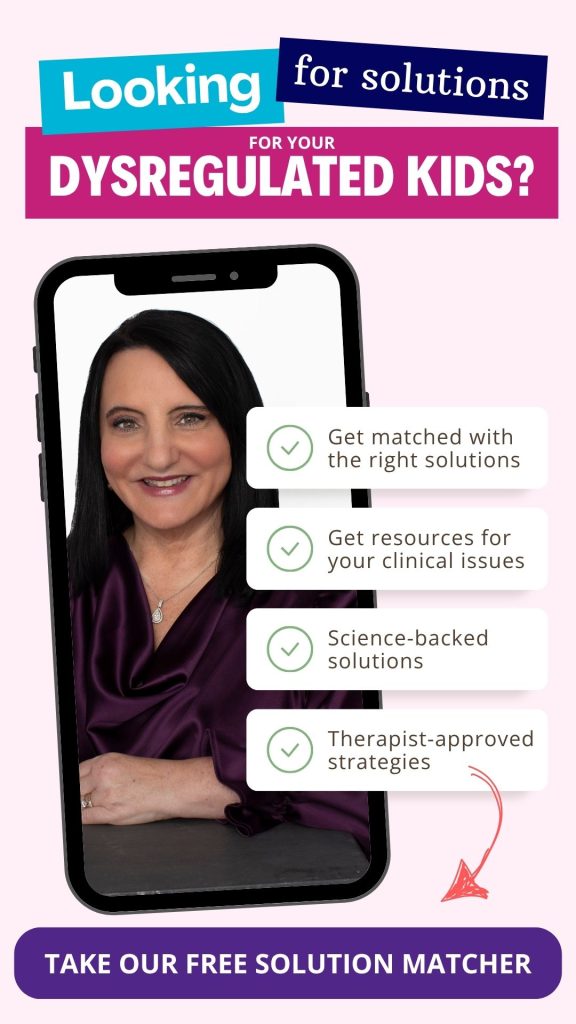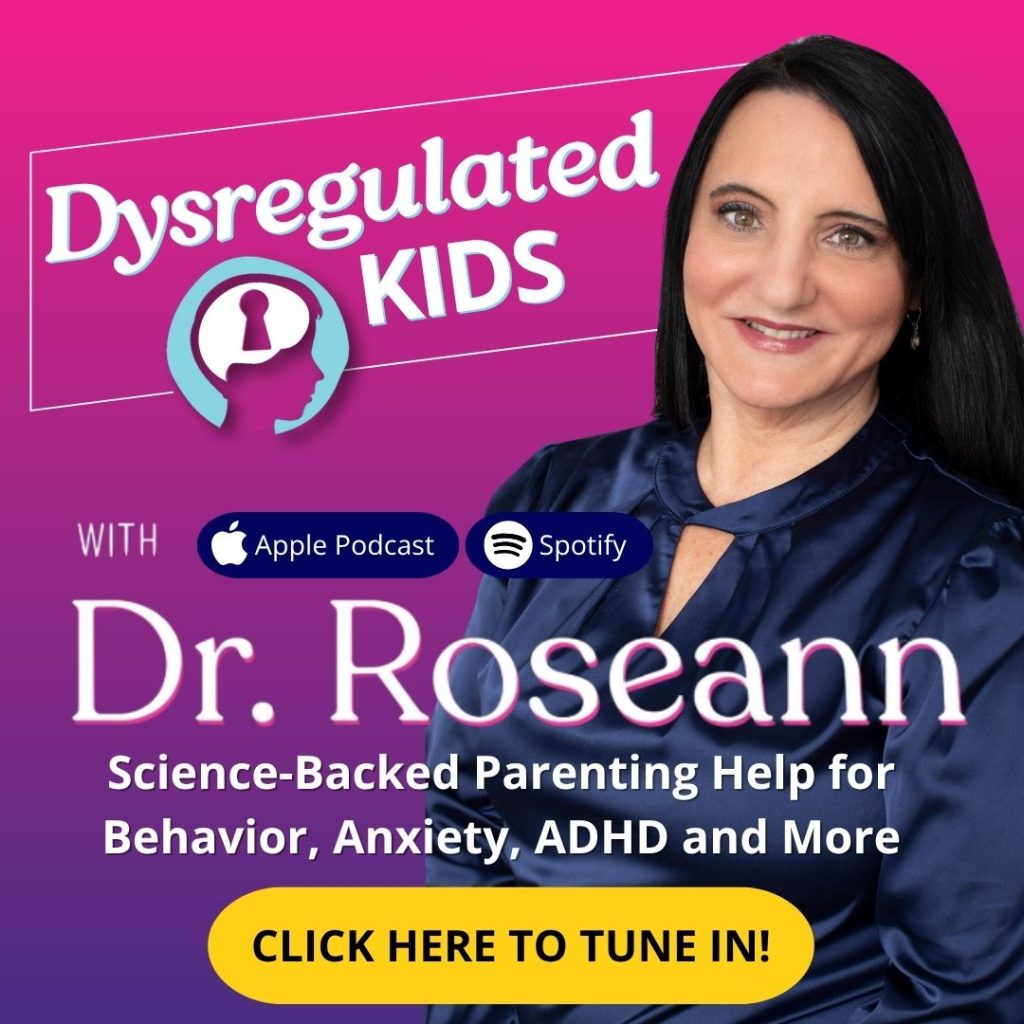Estimated reading time: 6 minutes
More kids than ever are being prescribed ADHD medication—and while these medicines can help some children focus and function, I see too many families rushed into prescriptions without the full picture.
When the real issue is a dysregulated brain, not every child benefits from a quick fix.
As a parent, it’s normal to feel torn. You want your child to thrive, but you also want to make choices that support long-term brain health.
In this article, we’ll unpack what’s behind the rise in ADHD prescriptions, explore the risks of overprescription, and walk through ways that can help you make confident, informed decisions—whether or not medication becomes part of your child’s plan.
Why Are ADHD Medications Overprescribed in Children?
Over the last couple of decades, ADHD diagnoses in kids have skyrocketed.
Recent CDC data show that ADHD diagnoses are still increasing, with about 11–12% of U.S. children—around 7 million— now having received a diagnosis (2022), up from 6.1 million in 2016. About 1 in 10 children still meet current criteria, and rates remain higher in boys than in girls. This steady rise highlights the importance of careful evaluations and exploring natural, brain-calming supports before deciding on medication.

The rise in ADHD diagnoses has fueled a surge in prescriptions. Many pediatricians feel pressure to offer band-aid solutions to parents and schools—yet those quick fixes often miss the real issue: a dysregulated brain.
Contributing factors include:
- Limited access to behavioral therapies or holistic care
- Insurance coverage that favors medication over therapy
- Misdiagnosis of dysregulation as ADHD
- School pressure for immediate academic improvement
Parent Story
Sarah, a mom of a nine-year-old, knows that story well. “The school pushed meds, but the side effects were brutal. When we focused on his nervous system instead, everything changed.” Her words echo what so many families discover—behavior is a clue, not a character flaw.
Overprescription doesn’t always equal the right solution. A child who blurts out in class or melts down at home might not need stimulants at all. Sometimes those actions are storm sirens warning us that the brain feels out of balance.
What Are the Risks of Overprescribing ADHD Medication?
Sure, stimulants like Adderall or Ritalin can sharpen focus in the moment. Kids may sit still longer or finally finish homework. Parents often feel relieved at first.
Yet those quick wins sometimes come with hidden costs.
Children may face the following risks:
- Mood swings or emotional blunting
- Loss of appetite and slowed growth
- Sleep troubles that ripple into the next day
- Heightened anxiety or OCD-like behaviors
Over time, kids can even feel like they ‘need’ the medication just to get through the day—something no parent wants for their child.
Research shows Ritalin is often prescribed too hastily without deeper evaluation or trying safer alternatives first (Chan et al., 2012). That’s like patching a leaky roof with tape—temporary at best, damaging at worst.
For many kids, medication fast-tracks miss the bigger clue: a nervous system that feels off balance. Behavior isn’t misbehavior—it’s communication. Calm the brain first, everything follows.
How Do I Know If My Child Is Overmedicated?

Every child responds differently to medication. Watch for these warning signs of overmedication:
- Sudden personality changes (loss of joy, increased irritability)
- Trouble sleeping or eating
- More meltdowns or withdrawal
- “Zombie-like” state or flat affect
Parent Example
Mark, whose 10-year-old started ADHD medication, noticed the change right away.
“He could sit through class, but he wasn’t my son anymore. The sparkle in his eyes was gone.”
The calm came at a cost—his energetic, curious boy now seemed distant, less himself.
If medication creates more struggles than it solves, it may be a sign your child’s needs aren’t being fully addressed.
Read more about: The Dangers of Medication: Complete Safety Guide for Parents
What Questions Should Parents Ask Before Starting ADHD Medication?
Before saying yes to a prescription, bring these questions to your provider. You have every right to ask them:
- Could my child’s behavior stem from nervous system dysregulation?
- What non-medication supports should we try first?
- How will we monitor side effects?
- What’s the plan if medication doesn’t help or makes things worse?
- How will we know when to reduce or stop medication?
You’re not being difficult—you’re being a protective parent. Asking the right questions is how you make sure your child’s brain gets the support it really needs.
What Can Parents Do If They Suspect Overprescription of ADHD Medication?
You have options and more power than you think. Simple steps can make a big difference:
- Track daily changes in mood, appetite, and sleep
- Partner with teachers on regulation tools, not just grades
- Seek a second opinion from providers who know neurofeedback or integrative care
- Practice co-regulation and model calm
You don’t have to choose between chaos and medication. Safer, regulation-first paths exist.
And if you’re looking for step-by-step natural supports, my Natural ADHD Formula Kit was created to help parents boost attention and school success without relying on stimulants.
Parent Action Steps
FAQs
Does ADHD always require medication?
No. Many kids improve with nervous system regulation, therapy, and healthy routines. Medication is one option, not the only path.
How do I talk to my child’s doctor about my concerns?
Come with notes, specific examples, and questions. Don’t hesitate to request a slower, regulation-first approach.
What percentage of kids are overprescribed ADHD medication?
Research shows many children receive prescriptions without full behavioral evaluation, though exact figures vary. Overprescription remains a real concern.
Are ADHD pills addictive?
When used properly, ADHD medication usually isn’t addictive. Misuse or overuse, however, can create dependency risks.
Can you take ADHD and anxiety meds at the same time?
Sometimes, yes. Some kids safely use both, though side effects must be monitored closely. Always consult your provider for guidance.
Citations
Chan, J. Y. C., Dennis, T. A., & MacLeod, M. A. (2012). The Over-prescription of Ritalin for Suspected Cases of ADHD. Ruor.uottawa.ca. https://hdl.handle.net/10393/34386
Danielson, M. L., Bitsko, R. H., Ghandour, R. M., Holbrook, J. R., Kogan, M. D., & Blumberg, S. J. (2018). Prevalence of Parent-Reported ADHD Diagnosis and Associated Treatment Among U.S. Children and Adolescents, 2016. Journal of Clinical Child & Adolescent Psychology, 47(2), 199–212. https://doi.org/10.1080/15374416.2017.1417860
Dr. Roseann is a mental health expert in ADHD who is frequently in the media:
- She Knows 11 Products Moms of Kids With ADHD Swear By to Maintain Order in the Chaos
- The Healthy 12 Silent Signs of Adult ADHD You Might Be Ignoring
- Fox5 News Natural Treatments for ADHD
Always remember… “Calm Brain, Happy Family™”
Disclaimer: This article is not intended to give health advice and it is recommended to consult with a physician before beginning any new wellness regime. *The effectiveness of diagnosis and treatment varies by patient and condition. Dr. Roseann Capanna-Hodge, LLC does not guarantee certain results.
Are you looking for SOLUTIONS for your struggling child or teen?
Dr. Roseann and her team are all about science-backed solutions, so you are in the right place!












